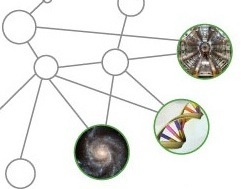Semantics and Metadata for Ecoinformatics
| PI: | Bruce Bargmeyer |
| Collaborators: | UCB Berkeley Water Center, Mayo Clinic, Director General Joint Research Center – Ispra, Wuhan University, Tokyo International University, Korea University, European Environment Agency, Microsoft Research |
| website: | N/A |
This project creates tools, techniques, designs and standards on the leading edge of semantics and metadat technologies. Demonstrations are in the area of ecoinformatics (health and the environment). Results
are broadly useful in many areas, including energy, defense and intelligence. The focus of the effort is to advance capabilities to link the semantics expressed in concept systems, metadata and data. Example application
areas include the semantic web, the use of semantics in scientific models, and more generally, semantic computing. This is depicted in the following figure. (should we insert the image here?)
In part this involves design of a metadata registry that can be used to register and curate concept systems (ontologies, taxonomies, thesauri, terminologies, etc.) and metadata that describes data. As a means of
broadly disseminating the R&D, the results are expressed as specifications for international standards, for progression through the International Organization for Standardization (ISO), in collaboration with the
World Wide Web Consortium (W3C) and Object Management Group (OMG). The funding agencies, other than NSF, also contribute staff and content for the collaborative, multidisciplinary effort. The effort also
works with projects at the UCB Berkeley Water Center, particularly with Microsoft Research staff developing SciScope, which helps to demonstrate how ontologies and metadata can be used to help people to discover,
evaluate, and draw together dispersed water data. The International Ecoinformatics Technical Collaboration (EITC), lead by EPA and the European Environment Agency, provides a formal international agreement under
which to organize the participants and to review the results. LBNL provides technical and organizational leadership and accomplishes key R&D activities. The designs for the next generation of metadata registries
are demonstrated in a web accessible eXtended Metadata Registry (XMDR) prototype at xmdr.org, developed and hosted by LBNL. The prototype software is available as open source software from LBNL.
